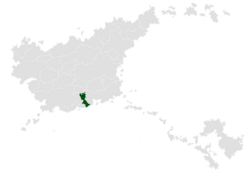Cispania: Difference between revisions
(Created page with "{{Region icon MusgorociaSC}} {{Infobox country |micronation = no |conventional_long_name = Republic of Cispania |native_name = ''République de cispanie'' (Fren...") |
|||
| Line 119: | Line 119: | ||
==Geography== | ==Geography== | ||
[[File:2015 Madeira Pana (169).JPG|220px|thumb|left|Laurel forests, typical of Northern Cispania.]] | [[File:2015 Madeira Pana (169).JPG|220px|thumb|left|Laurel forests, typical of Northern Cispania.]] | ||
Like much of southern Musgorocia, Cispania is generally mild, with warm weather for most of the year and often considerable precipitation outside the summer months. Coastal areas have few sandy beaches, mostly consisting of cliffs and gravel beaches. Grasslands and pastures dominate the landscape of southern Cispania, while the land further north becomes increasingly dominated by hills, mountains and verdant laurel forests. | |||
==Politics== | ==Politics== | ||
Revision as of 01:55, 9 July 2023
Republic of Cispania République de cispanie (French) | |
|---|---|
|
Flag | |
 Location of Cispania (dark green) in Musgorocia (grey) – [Legend] | |
| Capital and largest city | Valgrand |
| Official languages | French |
| Demonym(s) | Cispanian |
| Government | Unitary semi-presidential constitutional republic |
• President | Girard Caron |
• Prime Minister | Jean Vézina |
| Legislature | National Assembly |
| Area | |
• Total | 220,703 km2 (85,214 sq mi) |
| Population | |
• 2022 census | 4,679,528 |
| HDI (2022) | medium |
| Currency | Cispanian franc (C₣) (CFR) |
| Date format | dd/mm/yyyy (CE) |
| Driving side | right |
| Internet TLD | .ci |
Cispania, officially the Republic of Cispania is a sovereign state located in south-western Musgorocia. It is bordered by the Novarian Ocean to the south, Bourgougia and Côte d'Émeraude to the west, Roscait to the north and the State Federation to the west.
Since gaining its independence from the State Union, Cispania has struggled to develop economically. While the southern part of the country is relatively urbanised, the north is dominated by laurel forests and mountains. Since the early 2010s the Cispanian Civil War has raged between the government, based in Valgrand, and a loose collection of separatists, right-wing rebel groups and drug cartels based in the highly inaccessible north of the country (beyond the area known as Le goulot, the least wide part of the country measuring only 70 kilometres), fuelled by continued instability in the eastern part of Bourgougia following the end of the Bourgougian Civil War and a burgeoning illegal arms trade. As a result, it is one of the poorest countries in Musgorocia. It is one of few Musgorocian countries to maintain good diplomatic relations with Bourgougia and Thouthen, though unlike them, it hosts embassies from many other Musgorocian states, including Carloso and Barssois. It's government often acts in an intermediary role during diplomatic disputes. It is a member of the World Assembly (WA).
Geography
Like much of southern Musgorocia, Cispania is generally mild, with warm weather for most of the year and often considerable precipitation outside the summer months. Coastal areas have few sandy beaches, mostly consisting of cliffs and gravel beaches. Grasslands and pastures dominate the landscape of southern Cispania, while the land further north becomes increasingly dominated by hills, mountains and verdant laurel forests.
Politics
Cispania is a unitary semi-presidential constitutional republic. The President of Cispania, currently Girard Caron, is the head of state and is elected every five years in direct elections held under universal suffrage. The National Assembly is also elected every five years, from which the President appoints a Prime Minister, presently Jean Vézina. Since independence from the State Union, Cispanian politics has been dominated by the centre-left Radical Party, though parties of various persuasions are represented in the National Assembly, such as the centre-right Republican Party and far-left Socialist Party. Since 2012, elections have not been held in the northern regions of Cispania, owing to the ongoing Cispanian Civil War. Instead, non-partisan representatives from this region have been appointed by the President with the approval of the Constitutional Council.


